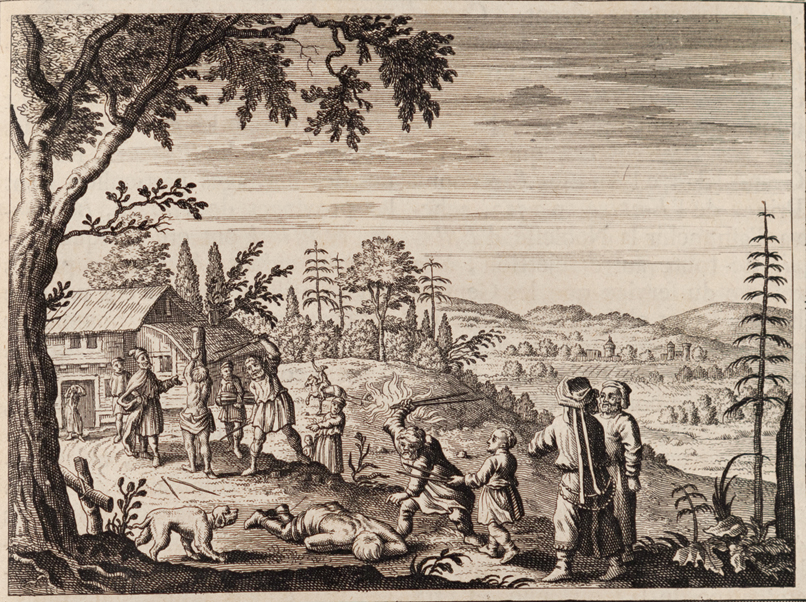Listening to the Past: A German Account of Russian Life
Seventeenth-
Knowledge of Russia came mainly from occasional travelers who had visited Muscovy and sometimes wrote accounts of what they saw. The most famous of these accounts was by the German Adam Olearius (ca. 1599–
“The government of the Russians is what political theorists call a “dominating and despotic monarchy,” where the sovereign, that is, the tsar or the grand prince who has obtained the crown by right of succession, rules the entire land alone, and all the people are his subjects, and where the nobles and princes no less than the common folk — townspeople and peasants — are his serfs and slaves, whom he rules and treats as a master treats his servants. . . .
If the Russians be considered in respect to their character, customs, and way of life, they are justly to be counted among the barbarians. . . . The vice of drunkenness is so common in this nation, among people of every station, clergy and laity, high and low, men and women, old and young, that when they are seen now and then lying about in the streets, wallowing in the mud, no attention is paid to it, as something habitual. If a cart driver comes upon such a drunken pig whom he happens to know, he shoves him onto his cart and drives him home, where he is paid his fare. No one ever refuses an opportunity to drink and to get drunk, at any time and in any place, and usually it is done with vodka. . . .
The Russians being naturally tough and born, as it were, for slavery, they must be kept under a harsh and strict yoke and must be driven to do their work with clubs and whips, which they suffer without impatience, because such is their station, and they are accustomed to it. Young and half-
Because of slavery and their rough and hard life, the Russians accept war readily and are well suited to it. On certain occasions, if need be, they reveal themselves as courageous and daring soldiers. . . .
Although the Russians, especially the common populace, living as slaves under a harsh yoke, can bear and endure a great deal out of love for their masters, yet if the pressure is beyond measure, then it can be said of them: “Patience, often wounded, finally turned into fury.” A dangerous indignation results, turned not so much against their sovereign as against the lower authorities, especially if the people have been much oppressed by them and by their supporters and have not been protected by the higher authorities. And once they are aroused and enraged, it is not easy to appease them. Then, disregarding all dangers that may ensue, they resort to every kind of violence and behave like madmen. . . . They own little; most of them have no feather beds; they lie on cushions, straw, mats, or their clothes; they sleep on benches and, in winter, like the non-

The Russians can endure extreme heat. In the bathhouse they stretch out on benches and let themselves be beaten and rubbed with bunches of birch twigs and wisps of bast (which I could not stand); and when they are hot and red all over and so exhausted that they can bear it no longer in the bathhouse, men and women rush outdoors naked and pour cold water over their bodies; in winter they even wallow in the snow and rub their skin with it as if it were soap; then they go back into the hot bathhouse. And since bathhouses are usually near rivers and brooks, they can throw themselves straight from the hot into the cold bath. . . .
Generally noble families, even the small nobility, rear their daughters in secluded chambers, keeping them hidden from outsiders; and a bridegroom is not allowed to have a look at his bride until he receives her in the bridal chamber. Therefore some happen to be deceived, being given a misshapen and sickly one instead of a fair one, and sometimes a kinswoman or even a maidservant instead of a daughter; of which there have been examples even among the highborn. No wonder therefore that often they live together like cats and dogs and that wife-
In the Kremlin and in the city there are a great many churches, chapels, and monasteries, both within and without the city walls, over two thousand in all. This is so because every nobleman who has some fortune has a chapel built for himself, and most of them are of stone. The stone churches are round and vaulted inside. . . . They allow neither organs nor any other musical instruments in their churches, saying: Instruments that have neither souls nor life cannot praise God. . . .
In their churches there hang many bells, sometimes five or six, the largest not over two hundredweights. They ring these bells to summon people to church, and also when the priest during mass raises the chalice. In Moscow, because of the multitude of churches and chapels, there are several thousand bells, which during the divine service create such a clang and din that one unaccustomed to it listens in amazement.”
Source: G. Vernadsky and R. T. Fisher, Jr., eds., A Source Book for Russian History from Early Times to 1917, vol. 1 (New Haven: Yale University Press, 1972), pp. 249–
QUESTIONS FOR ANALYSIS
- How did Olearius characterize the Russians in general? What evidence did he offer for his judgment?
- How might Olearius’s account help explain Stenka Razin’s rebellion (see “Building the Russian Empire”)?
- On the basis of these passages, why do you think Olearius’s book was so popular and influential in central and western Europe?